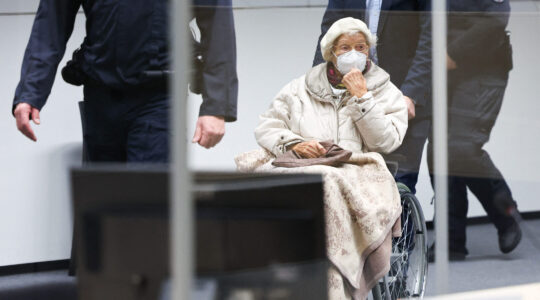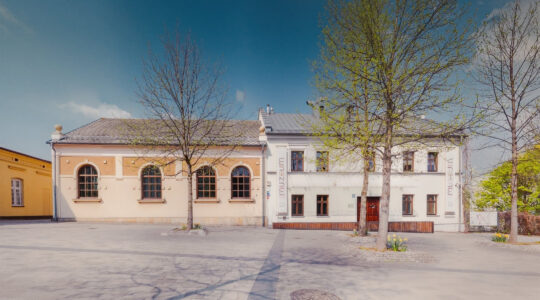LONDON (JTA) — With Britain’s three-way race for prime minister entering the final lap, many Jews in Britain are wondering what Nick Clegg’s meteoric rise — and the possibility of a “hung parliament” — means for them.
The dark-horse candidate from the Liberal Democratic Party has upended British politics with a surge in the polls that has put him in a virtual dead heat with the two other hopefuls for Britain’s top office: the incumbent, Gordon Brown of the Labor Party, and David Cameron of the Conservative Party, who holds a slight edge in the polls.
As no single party is expected to capture a majority of Parliament’s 650 seats in the May 6 ballot — known as a hung parliament — the office of prime minister may go to whichever party leader is able to secure a coalition deal or win the support of another party.
While Clegg, whose candidacy has drawn comparisons to that of Barack Obama, is unlikely to be that man, his party’s strength significantly increases the chances that the Liberal Democrats either will be a governing coalition partner, or that Clegg’s party will exact concessions in exchange for throwing its support behind a minority government of either the Conservatives or Labor.
“So many things are up in the air,” said Rosalind Preston, a vice president of the national Jewish umbrella body, the Board of Deputies of British Jews. “But one thing is certain: Whoever is elected will have to deal with some very real and pressing issues, not only on the national and international level, but as they affect British Jews on the home front.”
British Jews, she said, are concerned with “boycotts of Israeli goods, the spike of anti-Israeli resolutions and speakers on university campuses, and the impact of the economy on the social service sector.”
With the possibility looming that the ruling party will form a coalition with the Liberal Democrats, British Jews are preoccupied with the party’s record on Israel.
During the 2009 war in Gaza between Israel and Hamas, Clegg penned an Op-Ed in the Guardian newspaper calling on Labor to “condemn unambiguously Israel’s tactics” and demanding an immediate arms boycott of Israel by Britain and the European Union. Last December he was the lead signatory of a letter claiming that Israel has 1.5 million Palestinian prisoners, and he wrote that the legacy of Israel’s operation in Gaza is a “living nightmare” for Gaza’s residents.
Clegg’s party also has come under fire in pro-Israel circles for the activities of Jenny Tonge, a former member of Parliament who became a member of the House of Lords in 2005. In 2004, Tonge said she would become a suicide bomber if she had to suffer the indignities of the Palestinians. In 2006 she suggested that the pro-Israel lobby had “financial grips” on Britain and on her party. Last March she met with Hamas leader Khaled Mashaal in Syria.
The last straw came in February, when Tonge called for an inquiry into the far-fetched claim that Israel Defense Forces’ earthquake relief teams in Haiti harvested the organs of quake victims. Tonge’s remark prompted Clegg to fire her as the party’s spokeswoman for health in the House of Lords. Critics said the move came too late.
It didn’t help the party’s reputation in pro-Israel circles when William Wallace, a deputy Liberal Democratic leader in the House of Lords, offered a politically tone-deaf address when he met with the Board of Deputies of British Jews on April 18. Wallace defended Tonge’s “over-emotional approach” to Palestinian rights, called Israel’s Likud government “very intolerant of all criticism” and said Israel’s blockade of Gaza constituted “collective punishment.” Several members of the Board of Deputies walked out of the meeting in protest.
Later, a Liberal Democratic spokesman denied that the speech was anti-Israel and told the Jewish Chronicle, “It was because we are friends of Israel that we will be candid and critical.”
Meanwhile, Clegg used the second of three U.S.-style national debates to slam the Conservative Party for making common cause with far rightists and anti-Semites in Europe. In the April 22 debate, Clegg said Cameron has aligned himself with “nutters, anti-Semites, people who deny climate change exists and homophobes” in the European Parliament.
Clegg was referring to Cameron’s decision last year to ally the Conservative Party with right-wing nationalist parties in the European Conservatives and Reformists (ECR) grouping in Brussels.
Brown also criticized Cameron for his alliances.
“These are the friends David Cameron has chosen in order to satisfy the Euro-skeptic wing of his party,” Brown said. “I think that demonstrates poor judgment, and that British voters should understand the compromises to British values and British influence that the Tories are prepared to make in order to appease a significant section of their fanatical backbenchers.”
Cameron dismissed Brown’s charges as slurs, denied that the party is associated with anti-Semites and affirmed the Conservative Party’s pro-Israel record.
In such a closely contested and unpredictable national election, the three main parties are scrambling to chase every vote, including the Jewish ones.
While Jews traditionally have favored Labor over the Conservatives, Jews are upset with Labor’s failure to amend the universal jurisdiction law that permits private citizens to apply for the arrest of Israeli politicians for alleged war crimes while they are on British soil.
Cameron has said he would rescind the law.
As concerned as British Jews are with the party leadership race, because voters don’t vote directly for the prime minister, the race will be determined in large part by which way the votes go in local races, where bread-and-butter issues prevail. In Britain, the prime minister is determined as in Israel: by which party receives the most members in Parliament — or, if there is no majority, which party can cobble together a coalition.
“It’s easy for the political leadership to make global pronouncements on issues like anti-Semitism, national security or the Mideast peace process,” said Alex Goldberg, chief executive of the London Jewish Forum, which acts as a conduit between the London Jewish community and local governmental bodies. “But on the day after the election it’s the elected MP that is going to have to find ways to maintain funding levels for Jewish old-age homes, state-supported schools and the whole panoply of social services that are still reeling from the current economic downturn.”
In the midst of this year’s extraordinarily tight race, candidates for prime minister and hopefuls in Jewish districts appear to be stepping up their pandering to Jewish voters.
Geoffrey Alderman, a historian of British Jewry, sees this as a positive development: It means that in the scramble for ethnic votes, Jewish concerns matter, he said.
“Appealing for a Jewish vote,” Alderman said, “is a sign of a vibrant democratic state.”
JTA has documented Jewish history in real-time for over a century. Keep our journalism strong by joining us in supporting independent, award-winning reporting.





